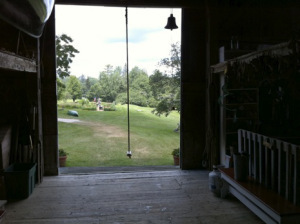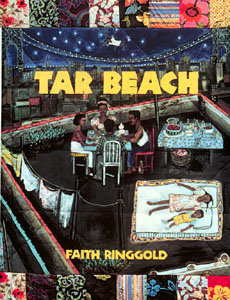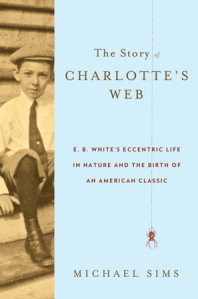Jeannine Atkins's Blog, page 29
February 10, 2012
Sometimes a Day Goes Like This
The chapter I'm set to revise has some good sentences. Hey, it has some sentences. I'm trying to focus on that, instead of the jumble of notes that clod most of the pages. There are some images that seem tired, and I'll need to wake them up. There are clumps and knots of half or quarter sentences, bits of dialogue looking for a home, and lots of directions: Fix this! Straighten out that! Those sort of exhortations that make me slump my shoulders. I know! Looking at all there is to do, I drop myself into the chair with the thought that it's time to get a ##*&^%$ draft done and get it to my writing group. Just finish the thing.
But I need to get the car inspected. It's not even the last day of the month. There's milk and lettuce to be fetched. Isn't there always? All of us can see where this train of thought is going. Away from the computer. Just finish the thing, I repeat to my whiny self.
And lo and behold, starting out slogging, by the end of the morning, one of the dusty images starts to look a wee bit shiny. Seeing things moving into new places, I'm ready to take a break to do a necessary errand. I leave my character just before a kiss. Walking across the parking lot, I realize that kiss of hers can wait. The novel will have more feeling if she ducks away.
Stepping away can have its writerly rewards, but first we have to have something moving to step away from, and properly time the drive or walk. What matters now is that I'm excited about a new turn in the chapter. Never mind that I'm further from finishing as I jot down more knotty sentences, broken dialogue, and images in need of polish in a notebook I always carry, and hurry through my errand, eager to get back to my desk.








February 6, 2012
Radiance, Manure, and Children's Literature
Even before we pay a swift homage to Margaret Wise Brown's Goodnight, Moon, I try to point my students' gazes toward the window, though we meet well before the sky turns dark. We read a passage from Eudora Welty's memoir, One Writer's Beginnings, where she recalls being a child seeing the moon turn from flat to round. "The word "moon" came into my mouth as though fed to me out of a silver spoon. Held in my mouth the moon became a word. It had the roundness of a Concord grape Grandpa took off his vine and gave me to suck out its skin and swallow whole, in Ohio."
All those o sounds get us ready for the circles of spider webs and seasons in Charlotte's Web, with its many mentions of wonder, the shimmer of dew on a web, and Charlotte's choice of the word radiance for Wilbur. On our way to see more sparkle in fairy tales, I introduce Faith Ringgold's picture book, Tar Beach. The blacktop roof in Harlem offers a safe place to wonder, an urban equivalent of what the barn was to Fern, where, trusted because of her patience and reverence, she heard the voices of animals.
In Tar Beach, Cassie Louise Lightfoot can fly. I point out the repeated mention of stars, and how the George Washington Bridge, which the narrator's father helped build, hoisting cables, is compared to a diamond necklace.
I spot a pair of raised eyebrows among 24 others that seem in their ordinary places, and get a teacher's glittery choice to decide whether to ask what that's about, or ignore them. I choose to ask, since controversy can open up talk early in the semester, and I'd appreciated the way this student had spoken up for Templeton, who of course ferreted away the rotten egg that first saved Charlotte's life and did a lot of necessary scurrying, including fetching newspapers as templates for the words Charlotte wove.
My student says, "I grew up near that bridge and it's ugly and dirty. There's nothing pretty or shiny about it."
Of course that's true, too. Ringgold's picture book features photographs of quilts, scraps turned into something bigger and maybe more beautiful, putting together memory and fantasy. The rooftop isn't really much of a beach either. I hope not to hide truth with something shimmery, but to remember how E.B. White mentions manure, an important part of life, almost as often as radiance: for one thing, whatever you think of its smell, it helps seeds grow. There's no day without night, and a book isn't wholly a book until it has readers, and there will be all kinds.
We move onward to fairy tales, which Tolkien says let us "breathe a lie through silver." There will be glimmering that suggests another world, more flying, and its lightness, but plenty of dark forests, too.
(Thanking my husband Peter, who took the moon photo in just the right light to show those craters. The photo of E.B.White's barn and rope swing is from the New Yorker, and you can enjoy more on this link.)








February 1, 2012
The Story of Charlotte's Web by Michael Sims
Some biographies have too many words for me. I don't need to know all the names of ancestors, or what happened, say, on every Tuesday. And some biographies are sad. Why couldn't A.A.Milne and his only son, Christopher Robin, just get along?
But E.B. White turns out to be the guy you want him to be, and The Story of Charlotte's Web: E.B. White's Eccentric Life in Nature and the Birth of an American Classic by Michael Sims is just long enough.My only quibble is with the subtitle. Eccentric? Whoever wrote that title (my guess is that it wasn't the author) clearly hasn't spent much time around writers, where E.B. White would pass unnoticed.
I particularly loved reading about his childhood, when the beloved youngest child hung out in the stable in the home outside of New York City. He liked the smell of horses, and searching out spiders; he developed an early infatuation with eggs, which play a symbolic part in much of his writing. His parents started taking him to Maine in hopes of helping his hay fever, which probably got worse, but he didn't care. He loved the lakes and woods. His dating life in high school wasn't much as the few times he dared to ask a girl out he didn't talk. College at Cornell, where he was first called Andy, a name that stuck, wasn't much better. He wrote one girl a poem comparing her eyes to that of a dog, which he meant as a tribute.
He found himself as a writer working for the New Yorker and eventually fell in love with and married editor and writer Katherine Angell, whose first husband had come back from WWI with what the biographer calls "French ideas of marriage." Michael Sims doesn't dwell on the relationship, but chooses just the right scenes. When Katherine seemed in danger of dying giving birth to her and Andy's one child, losing enough blood so that someone had to run out and get some from a taxi driver, a nurse asked Katherine, "Would you like to say a little prayer, deary?"
"Certainly not!" Katherine snapped, and I felt I got about all I needed to know about her.
We learn about E.B.White's slow and thoughtful writing methods and his relationship with Ursula Nordstrom, who also edited books of Margaret Wise Brown, Maurice Sendak, and Laura Ingalls Wilder. I liked hearing about the year he spent studying spiders, and the year he took between a draft of Charlotte's Web that began with the barn and a draft in which he added five chapters about Fern. He wrote "I kept the manuscript in a cardboard box like a kitten." And out came the girl yelling at her father about injustice. It was fascinating to read about how facts White learned about animals helped develop the plot and the arc from spring to fall. He used details such as seeing a spider's egg sac look to him like cotton candy, which of course connected to the fair.
This biography is full of wonderful quotes (how many times is "wonder" used in Charlotte's Web, and how is it perfect every time?) that will make you want to reread the novel or perhaps, like me, read White's essays. Apparently he, Katherine, and Joe read Little Women aloud at nights: I need to find if he ever wrote about that!
The biography ends with his stepson Roger Angell speaking at the well-attended funeral of a man who was perhaps happiest among animals. "If E. B. White were able to be here, he wouldn't have been here." He was a person who'd always choose the barn, and what a beautiful place he found there. Let me leave you with this from Charlotte's Web: "It was the best place to be… with the garrulous geese, the changing seasons, the heat of the sun, the passage of swallows, the nearness of rats, the sameness of sheep, the love of spiders, the smell of manure, and the glory of everything."








January 20, 2012
A Poem for Ed Smith
On Tuesday I lost a dear friend. Since then there have been lots of phone calls, some with people I love and some with people I hardly know. Talking of shock and memories, and photos and food. I've been writing a talk for the service this weekend: that strange work of trying to put a life, one you're aching over losing, into a few words. Trying to balance between wanting so badly to honor this person and accepting the inevitability of failing to do enough.
Yesterday I went to bed feeling too much on my shoulders. This morning I woke up to snow on the ground, and the voice of my good friend, Karen, in my head, saying, "Jeannine, you're looking out for others, but what do you need?" This morning I needed to look at the snow and write a poem. Here it is:
For Ed Smith
September 4, 1954 – January 17, 2012
The big-shouldered man in a flannel shirt planted
sweet peas, bright petunias, morning glories
that would brim from hanging pots.
Music broke on the walls of the greenhouse
where loyal white dogs named after mountains
dozed on the floor or sought shade in the barn.
Shelves held pieces of old trucks, gears, motors,
wrenches, hammers, and old slate.
Among the pines between barn and house,
cardinals and chickadees peck for seed.
Who will fill the feeders now? Three springs ago,
I watched other birds from the kitchen Ed built,
heard his footsteps through the garage and stood
to open my arms. He knew what that meant,
held on for a shaky minute, then went straight
to the bedroom to say goodbye. Even during
the first days of missing Pat,
I don't think this good husband forgot to feed the birds.
The big dog lumbered as we paced the back yard
talking of songs, food, and champagne, listened
to the brook, stared at the walls of the barn
filled with parts of old cars and wood to fix doors.
Ed could mend almost anything.








January 13, 2012
Crossing
Those small moments within the sweep of action bring back the poet, who never entirely went away. She’s alert for alliteration, and blotting most out. Attentive to cadence, and making sure it seems honest. And probably most of all hunkering over images with hands open like a child eager to catch a dragonfly or frog, then looks closely at what’s precariously held: for subtle beauty, and what this curious animal might say if she could speak. For signs of where she wants to go.
And as a novelist for the time being, I get to follow with a wildly waving net.
You can celebrate Poetry Friday at A Teaching Life, a blog sure to inspire anyone who teaches writing, or teaches, or writes.
January 6, 2012
The Bravery of Silence and White Space
I recently wrote a poem that I gave to my husband to read. As I expected, Peter had comments about this or that word choice, and some reservations about the tense I chose, but his most meaningful comment was his charge to tell a little less. The way he put it was to have confidence in the story within the poem, and to cut words that were explanatory. That is, get rid of my signposts that indicated: important news ahead! Pay attention! or In case you didn’t know…
Could I do without these markers? I hit delete here, and there, and still another there. I survived. I think the poem survived.
Writing poetry is full of these breath-catching deletions. How much can we take out and still make just enough sense? How much can we peel away, while leaving a sense of the moment that first engaged us? I’ve long thought of paring down as a core of writing poetry, but I hadn’t thought about it in terms of courage. It’s not a word I usually apply to myself, soft-spoken me who prefers watching from sidelines to scuffling in a field. Yet every phrase we dare to pull out, every word we pluck, does leave me a bit more light-headed. There’s no measure in this reckless business where we hope to leave something for readers to grab onto, but with spaces to do their own scrambling and make the words feel like their own. Sometimes you want to see skaters swinging their arms, the sunlight on the pond. And sometimes the sound of scraping skates will do.
Teaching Authors is hosting Poetry Friday today!
January 5, 2012
A Candle in the Writing Room
It’s the season of new calendars and resolutions, and I’ve been cheering in particular for those who aim to make this year really count as writers. Gail Gauthier is doing a blog series called Time Management Tuesdays. In a post called Defining Work, Jo Knowles chronicles some of her transition to writing as a full-time job, and remembers the purity she felt starting out immersed in stories she felt she had to tell. Kelly Fineman wrote an insightful short blog series on commitment. Some friends are trying Freedom for the Mac, and others are dedicating days and times for different sorts of writing.
I’m learning from so many thoughtful people, but ideas about schedules, vows, restrictions, or even themes weren’t sounding like just what I needed. I was thinking I’d forget the whole renewal notion. Things weren’t so bad. I was writing, even through a rough week. Then, looking for a book on my shelf I put my hand on one I wasn’t looking for, but which I thought would move a friend who shares my grief about someone who’s very ill. I knew this book wouldn’t make our sorrow any less, but it was still worth giving and reading. Flipping through the poems, I realized that rough, inexact beauty, the kind that’s inseparable from truth, often keeps me moving forward in hard times, and maybe that’s what keeps me going as a writer, too.
It's my simple plan -- and I don’t have to count words, hours, anything. I’m going to slowly move forward with my winding and unwinding project that won’t be finished until I can make it as beautiful as I feel the subject deserves. Each day, I mean to nudge a page, paragraph, or line to be a little more elegant, tender, or spacious. I’ll work until I can celebrate a few words that fit my own definition of beauty, which others may call gritty, plain, boring, or even unfit for human eyes. There might not be much overlap with what’s pretty, but something more along the lines of carols in an over-decorated hospital room. An awkward beauty, like we sometimes feel bearing chocolate or flowers, which we know aren’t enough.
This plan to add a smidge or layer of something that wakes up my eye keeps the focus between me and the paper or screen. I’m approaching it like the form of meditation I sometimes do -- very gentle, western, undemanding: when thoughts stray, just quietly, guiltlessly, go back through mess and mayhem and start again. Some days all I might manage of beauty is moving a not-quite-there sentence up to one that’s finished. Or deciding a scene whose potential I can gauge is triumph enough. My method is forgiving; maybe it’s middle child luck, but while I hold to certain standards, I’ve never been one to fall for perfection. I’m just hoping to plod my way into making something sparkle or hum a bit, and letting an edge or a small corner count. This is not about “you must,” dividing my scolding self from my creative one. It’s about rewards, right in the process, not failures or punishments.
So I’m forgoing new vows and schedules, though not bribes (offer me a latte, and I’ll give you an hour or two of words). I’m lighting a candle as I work as a reminder to keep creeping toward something that flickers, warms, casts a shadow that may look ordinary. Maybe I’ll later switch up beeswax and flame for flowers. Trying in life and in writing to see the whole. There’s news of illness, but also singing. There’s a scrap of paper by my elbow, with a phone number reminding me of a visit to be set up, and how I must listen in order to know what my friend needs, as well as being the person who’s clueless about what to say. And there’s a cardinal at the bird feeder.
December 15, 2011
Discipline and Disobedience
She gets told that she’s the only one who can write the book in my files. She shrugs. She’s reminded of how good she’ll feel when it’s done. Another shrug. I see her start to listen when told that the beginning is always the hardest part of the day, but it’s best to stop lecturing while I’m ahead and turn to bribes and tricks. I tell her that she’ll have to work only an hour today or that it’s okay to shirk the task at hand, but tackle another page or poem or chapter. Or that we’ll only do a little tidying, typing in marked parts of my manuscript or moving notes I inserted onto the ends of chapters.
Finding places for these notes leads me to new places and some new ideas. Often, what started as cleanup leads to engagement, and it doesn’t matter that the work is happening in chapter 5 instead of 11, that my protagonist is in Boston instead of Italy. There’s the old standby, Just ten minutes, just half a page. Once I push myself in, more often than not I’m snared. But don’t tell that to the rebel within me. I won’t offer her bribes for good behavior. Well, maybe there’s a cookie, or lighting a candle on this gray day, or another peek at facebook. But I’ll let her steal what she wants. I’m not sure I want her to know my tricks.
December 12, 2011
Characters Aren't Our Children
I want to protect this person I like so much. I want her to wear best clothes, hold her kindest expressions, buckle her seat belt, don’t text and drive, and please keep her jealousies and bitter moments to herself. No, I don’t. I have to shove the mom out of the room when I write.
It’s better to be like the stepmother who sends children into the forest with crumbs of stale bread, and not even a reminder to keep away from witches and candy houses. Our characters should get in trouble. They should stumble all over themselves, collide into bad decisions and traps.
As a mom, I tried to my daughter choose her own paths, become her own self. But with my characters, it feels right to, well, not to tell her what to wear, but to try on her clothes in the privacy of my writing room. To read her diary, even if I’m writing it as I read. To be overbearing with questions, to ask what happened at every party, to investigate the genesis of every tear. Only on this fourth revision do I sometimes feel I not only love, but sort of am my main character. That crossing over is when I know the manuscript is really starting to wake up.
December 8, 2011
The Uncommon Life of Wendy Wasserstein
Wendy Wasserstein (1950-2006) wrote novels, essays, and plays, including The Heidi Chronicles, which won a Pulitzer Prize and Tony award.She or her mother seemed to have saved just about everything. We can read from several of those hand-sized diaries with cheap gilded locks, and see her humor and eye for detail and tragedy in ordinary events evident even when she was young. There’s a story from camp about buying a pencil at the canteen: “And I chewed some of it. So Caren had to tell everybody.” In high school, some of the diary seems to take off into fiction.
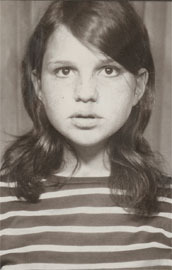
Later, letters include memories of her years at Mount Holyoke. She was a history major who decided to take a playwriting class at Smith partly because the shopping was better in Northampton (still true).
Her decision to go to graduate school at Yale is chronicled, and there are photographs including one of Meryl Streep, who also studied there then. A play she drafted there, The Uncommon Woman and Others, was later performed on Broadway, and photographs of the all-women cast include Kim Cattrel and Sarah Jessica Parker, as well as a quote from a sweet note she sent to Wendy.
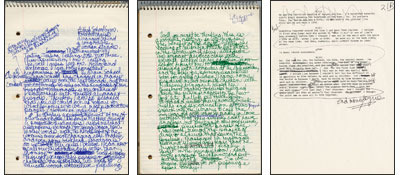
The show, which remains open until April 15, 2012, gives a good sense of how Wendy’s life inspired her writing and humor, which often had an edge. How could it not when, upon hearing that Wendy won a Pulitzer prize, her mother apparently said that she’d be happier if she brought home a husband? Perhaps my favorite display was made of photocopies of drafts of a play, showing how she revised tirelessly in search of, then moving toward, a key line. We see her deleting a final line of The Heidi Chronicles (noting “this is silly” in the margins) and shifted dialogue between two characters to a monologue near the end: “I thought the whole point was that we shouldn’t feel stranded. I thought we were in this together.”
A quote from a journal shows Wendy’s affection for her years at Mount Holyoke College, and it’s nice to know that Mount Holyoke, as well as Broadway, which dimmed its lights on the night after her death, loves her back.


